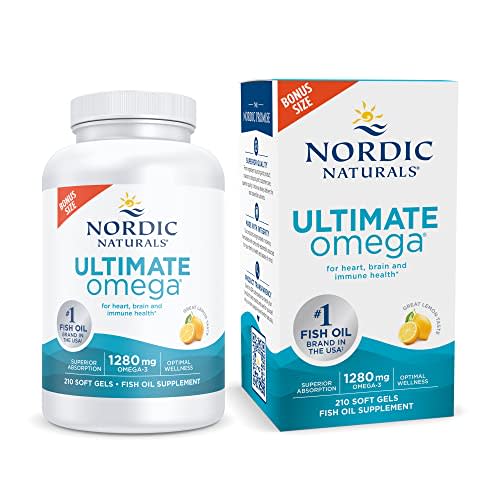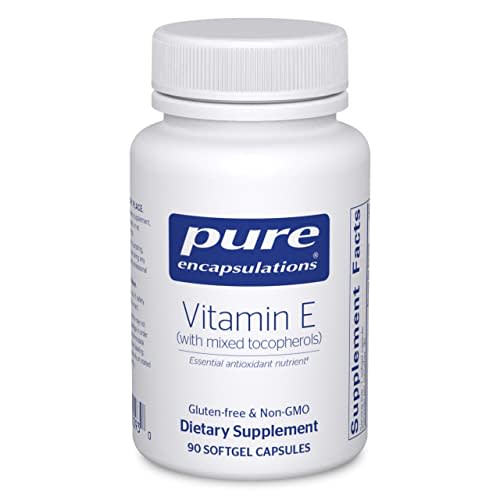The 5 Best Supplements To Take To Help Prevent Dementia, According to Brain Health Experts
As a multitude of scientific studies have shown, what we eat and drink has a direct impact on our brains. (Soda, alcohol and sugary treats? Not great for it. Fish, olive oil and veggies? Gold star.) Brain health experts have even pinpointed specific nutrients that are especially important for brain health, including helping to lower the risk of dementia.
Ideally, everyone would get all these nutrients through food. “Experts agree that the best source of vitamins and other nutrients is from whole foods as part of a balanced diet,” says Dr. Heather M. Snyder, Ph.D., the Vice President of Medical and Scientific Relations at Alzheimer’s Association. However, she adds that experts also recognize that this isn’t always possible. That’s where supplements can come in handy—to fill in the gaps.
While it’s important to know that no single food, beverage, ingredient, vitamin or supplement has been proven to prevent, treat or cure Alzheimer's disease, having your nutritional bases covered can certainly help. If dementia prevention is at the top of your health goals and you’re worried you aren’t getting what you need through diet alone, here are five supplements to consider asking your doctor about.
Here at Parade.com, we're all about sharing products we love with our audience. When you make a purchase on an item seen on this page, we may earn a commission, however, all picks are independently chosen unless otherwise mentioned.
What To Keep In Mind When Shopping for Brain Health Supplements
Anytime you shop for supplements, it’s important to do your research to make sure you’re actually getting your money’s worth—and make sure that they actually contain the nutrients they claim to. “Supplements are not regulated like prescription medication, so may vary considerably in quality. Further, one should consult their primary care provider to ensure that a supplement is not contraindicated for them and will not interfere or interact with other prescription or over-the-counter medications they may be taking,” says Dr. Lynn A. Schaefer, PhD, ABPP-CN, a neuropsychologist at Nassau University Medical Center.
Look for supplements that have been tested by an independent third party such as ConsumerLab, US Pharmacopeial Convention Dietary Supplement Verification Program, or Labdoor. This will ensure that there is nothing toxic in the supplements and that the ingredients and dosage match up with what’s advertised.
With that in mind, these are the five supplements brain health experts recommend for dementia prevention.
Related: Want To Improve Your Brain Health? Experts Agree This Is the Most Important Supplement to Take
5 Supplements To Help Prevent Dementia Dementia, According to Brain Health Experts
1. Folic acid
While all B vitamins support brain health, Dr. Schaefer says that folic acid is the one that’s shown the most promise in dementia prevention. In one study involving people who had been newly diagnosed with dementia, those who took a folic acid supplement for six months had a significantly greater increase in serum folate (which is important for cognitive function) than those who didn’t take a supplement. To get your folic acid through food, focus on eating more leafy greens, beans, whole grains, fruit and sunflower seeds.
Independently third-party-tested folic acid supplements include Now Folic Acid With Vitamin B-12 ($6.36), Nature’s Bounty Folic Acid ($17.98) and Nature’s Made Folic Acid ($5.68).
NOW Supplements, Folic Acid 800 mcg + B-12 (Cyanocobalamin) 25 mcg, B Complex Vitamin, 250 Tablets
2. Vitamin D
An estimated 35 percent of American adults don’t get enough vitamin D—a very important nutrient for brain health. “Vitamin D, known as the ‘sunshine vitamin,’ has antioxidant and anti-inflammatory properties, and serves as a neuro-steroid in the brain. Receptors for vitamin D are found in the hippocampus, which plays an important role in memory formation,” Dr. Shaefer says. While one mouse study showed that taking a vitamin D supplement actually increased the risk of dementia, one more recent study of 12,388 people showed that taking a vitamin D supplement could lower the risk of dementia by as much as 40 percent.
Vitamin D supplements to consider include Pure Encapsulations Vitamin D3 Liquid ($36), HUM Nutrition Here Comes the Sun ($20) and Well Told Health Plant-Based Vitamin D ($19.99).
Pure Encapsulations Vitamin D3 (Vegan) Liquid | Hypoallergenic Support for Bone, Breast, Cardiovascular, Colon and Immune Health* | 0.3 fl. oz.
Related: Vitamin D Is Key for Protecting Your Health—Are You Getting Enough? Here's What to Know
3. Fish oil (omega-3)
There’s a reason why fish is commonly referred to as “brain food.” Dr. Schaefer says that the omega-3s in fish are important for supporting memory and brain cell communication. If you don’t eat fish regularly, it’s worth it to consider taking a fish oil supplement. One study of more than 82,000 people showed that taking a fish oil supplement significantly helped lower the risk of dementia.
Independently third-party tested fish oil supplements to consider include Nordic Naturals Ultimate Omega Softgels ($67.95), Care/of Fish Oil Softgels ($16) and Life Extension Super Omega-3 Softgels ($27).
Nordic Naturals Ultimate Omega, Lemon Flavor - 210 Soft Gels - 1280 mg Omega-3 - High-Potency Omega-3 Fish Oil with EPA & DHA - Promotes Brain & Heart Health - Non-GMO - 105 Servings
4. Vitamin E
Vitamin E is another nutrient that Dr. Schaefer says recent scientific studies are showing may be beneficial for dementia prevention. This is because vitamin E helps with neuroplasticity, which is the brain’s ability to form new connections—key to learning. Vitamin E is also an antioxidant, which helps prevent and reduce chronic inflammation in the brain.
Foods with vitamin E include sunflower seeds, almonds, corn oil and soybean oil. Vitamin E supplements to consider include Pure Encapsulations Vitamin E ($34.30), Nordic Naturals Vitamin E Complex ($17.81) and CVS Health Vitamin E ($14.99).
Pure Encapsulations Vitamin E (with Mixed Tocopherols) | Antioxidant Supplement to Support Cellular Respiration and Cardiovascular Health* | 90 Softgel Capsules
5. Curcumin
In terms of herbal supplements to add to your dementia prevention all-star lineup, Dr. Schaefer says one to consider is curcumin, which is found in turmeric. “Curcumin has also been shown in both animal and human studies to be neuroprotective in a number of neurodegenerative diseases,” she says, though she adds that its use to prevent dementia requires further study including dosage, how long it can be used and the most bioavailable form for sufficient absorption. The reason why curcumin is beneficial for brain health is because it helps prevent and reduce chronic inflammation.
Curcumin supplements to consider include Thorne Curcumin Phytosome ($32), Nature Made Turmeric ($25.99) and My Kind Organics Maximum Strength Turmeric ($21.94).
Thorne Curcumin Phytosome 1000 mg (Meriva) - Clinically Studied, High Absorption - Supports Healthy Inflammatory Response in Joints, Muscles, GI Tract, Liver, and Brain - 60 Capsules - 30 Servings
Both experts reiterate that the very best way to minimize your risk for dementia is by eating a wide range of nutrient-dense foods, avoiding overly processed foods high in sugar, prioritizing regular exercise and getting good sleep. But supplements can help fill in any nutritional gaps you may not be getting through diet. And with this list, now you know exactly what to ask your doctor about.
Next up, this is the absolute worst food for brain health.
Sources
Dr. Heather M. Snyder, Ph.D., Vice President of Medical and Scientific Relations at Alzheimer’s Association
Dr. Lynn A. Schaefer, Ph.D., ABPP-CN, a neuropsychologist at Nassau University Medical Center






